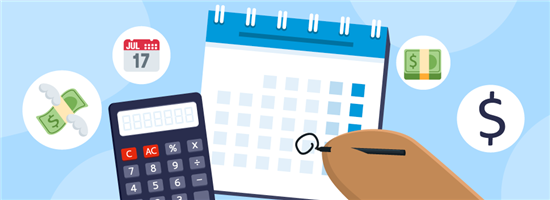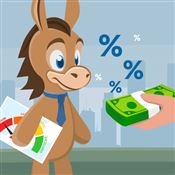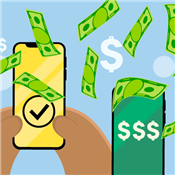Payday Loan Calculator
Payday loans can be an easy source of quick cash. But how costly they can be? Use this payday loan calculator to find out.
 |
Strapped for cash and need it for an unexpected expense? You might be tempted to get a payday loan.
Payday loans are convenient because there aren't a lot of requirements. They're instant and you don't need to provide collateral.
Borrow $100 to $50,000
- Loans from $100 to $50,000 subject to approval
- Online form takes less than 5 minutes to complete
- If approved, you may get your money in as little as 24 hours
But this convenience comes with a very high cost. Before you get a payday loan, use this calculator to determine how much a payday loan could cost you down the road.
What Is a Payday Loan?
A payday loan is a short-term loan (typically lasting two weeks to a month) at a high rate of interest. Lenders provide you with money, which you pay back (plus a fee) on your next payday. The amount you can borrow depends on how much you earn on your next paycheck.
There are four main components of a payday loan:
- Payday loan amount (principal)
This refers to the amount you borrow. It'll depend on how much you earn per payday, but some states impose a limit on how much you can borrow. - Finance charge
This is the interest fee of a payday loan. It usually ranges from $10 to $30 for every $100 borrowed. For context, a two-week payday loan with a $15 per $100 fee equates to an APR of 391.07%. - Loan term
This is the amount of time that you have to pay off the payday loan. Most payday loans have a 2-week loan term. - Other fees
Some lenders may charge additional fees on top of the usual finance charge. Be mindful of these charges as they can easily balloon the cost of your payday loan.
Most payday loans are lump sum. This means that when it's due, you pay back the amount plus a fee.
The payment method will depend on the loan agreement. Some lenders may require a post-dated check. You may also authorize electronic debit of funds from your bank, credit union, or prepaid card account.
Payday loan providers don't usually conduct credit checks. In exchange, they charge high-interest rates because of the risk they take.
How to Use the Payday Loan Calculator
Using this payday loan calculator is simple and quick. Here's how to use it:
- Enter the payday loan amount
- Enter the finance charge and other fees
- Enter the loan term
From there, click "Calculate." You should see the annual percentage rate (APR) of your payday loan. Additionally, you'll see your total debt and how much it would cost to keep renewing your payday loan.
Calculating for Rates on Payday Loans
If you want to calculate the interest or APR on your payday loan manually, you'll first need to add up the finance charge and other fees. Then, divide the sum by the payday loan amount.
From there, multiply the result by 365 (the no. of days in a year) and divide it by the loan term (in days). Here's what it would look like in a formula:
APR = ((Finance Charge + Other Fees) ÷ Payday Loan Amount) x 365 ÷ Loan Term
Let's say you get a $300 payday loan. The finance charge is $12 per $100 loaned, meaning you pay $36 in fees. The loan term is two weeks and there are no other fees. Here's what that calculation would look like:
3.1286 (or 312.86%) = (($36 + $0) ÷ $300) x 365 ÷ 14
From there, you can multiply the percentage by the amount borrowed ($300 x 312.86%). If you keep rerolling your payday loan for a year, it'll cost you $938.57 in interest fees.
Pros and Cons of Payday Loans
Pros:
- No strict requirements (unlike personal/business loans)
- Accessible online with a payday loan app
- Quick access to cash
- No need for collateral
Cons:
- Very high APRs
- Predatory lending practices
- Financial health risks
Payday loans usually only require a bank account, government ID, and proof of income (e.g., pay stubs). They also won't run credit checks, which could provide immediate financial relief in emergencies.
However, it's important to use them only when absolutely necessary and with extreme caution. Payday loans are sometimes considered predatory practices because they can lead to potential long-term financial difficulties.
Make sure to pay your payday loans on time to avoid any extra fees. If you feel like you can't pay them right away, it's better that you stay away and consider alternatives.
What Happens if You Can't Repay on Time?
If you can't repay your payday loan on time, you may be charged a late fee in addition to the finance charge.
Some lenders may offer to roll over or renew your payday loan. While this may seemingly be the more amicable solution, it can lead to an even worse situation.
If you keep rerolling your payday loan, the fees and interest can quickly add up. They could even go higher than the principal amount—imagine paying $400 back for borrowing $100.
If you can't or don't repay a payday loan, the lender may withdraw money from your bank account (assuming your loan agreement allows it). In extreme cases, a collection agency may get involved, or the lender may file a lawsuit.
How Much Can Lenders Charge on Loans?
In the US, the maximum amount lenders can charge on a payday loan varies depending on the state. State laws set limits on the maximum interest that payday lenders can charge.[1]
That said, it can vary from state to state, with some states even banning payday loans altogether. Some states only allow a certain percentage of the principal amount (e.g., 17.5%, 25%, etc.). There are also states that allow a certain amount per $100 borrowed (e.g., $15 per $100).
Alternatives to Payday Loans
Payday loans are quick and convenient, but with how costly they can be, it's best to treat them as a last resort. If you're in a pinch and need quick cash, consider these alternatives first:
- Ask for an advance on your salary
In case of emergencies, employers may allow you to get an advance on your next salary. This may be a better option because these don't carry interest. - Sell some of your stuff
Do some spring cleaning and sell stuff you aren't using anymore. This will help you generate cash and could be a great source of extra money. - Take a pawn loan
Don't want to part ways with your stuff? You can pawn it instead. The pawnshop will hold your things and lend you an amount equal to or a portion of the item's resale value. Just remember to repay the loan so you can get your stuff back. - Borrow from family or friends
Although family and friends may not always be able to lend you money, they could help in other ways. For example, they could bring food and other necessities. This allows you to use your money on other expenses like rent. - Use a credit card
If you have a credit card and haven't maxed it out yet, use it before considering payday loans. They often give you more time for repayment and you can break your payments into smaller parts (like installments). Plus, if you pay your credit card bills on time, you can avoid paying interest fees.
Bottom Line
Payday loans can be convenient, but you should only use them as a last resort. Before getting one, use the payday loan calculator above to see how much you'll end up paying. If you can afford it, then go ahead. If you can't, it might be time to consider the alternatives.
References
- ^ NCSL. Payday Lending State Statutes, Retrieved 01/22/24
Note: This website is made possible through financial relationships with some of the products and services mentioned on this site. We may receive compensation if you shop through links in our content. You do not have to use our links, but you help support CreditDonkey if you do.
|
|
| ||||||
|
|
|













